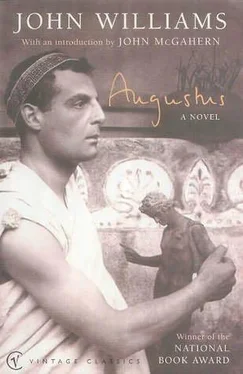John Williams - Augustus
Здесь есть возможность читать онлайн «John Williams - Augustus» весь текст электронной книги совершенно бесплатно (целиком полную версию без сокращений). В некоторых случаях можно слушать аудио, скачать через торрент в формате fb2 и присутствует краткое содержание. Жанр: Историческая проза, на английском языке. Описание произведения, (предисловие) а так же отзывы посетителей доступны на портале библиотеки ЛибКат.
- Название:Augustus
- Автор:
- Жанр:
- Год:неизвестен
- ISBN:нет данных
- Рейтинг книги:3 / 5. Голосов: 1
-
Избранное:Добавить в избранное
- Отзывы:
-
Ваша оценка:
- 60
- 1
- 2
- 3
- 4
- 5
Augustus: краткое содержание, описание и аннотация
Предлагаем к чтению аннотацию, описание, краткое содержание или предисловие (зависит от того, что написал сам автор книги «Augustus»). Если вы не нашли необходимую информацию о книге — напишите в комментариях, мы постараемся отыскать её.
Augustus — читать онлайн бесплатно полную книгу (весь текст) целиком
Ниже представлен текст книги, разбитый по страницам. Система сохранения места последней прочитанной страницы, позволяет с удобством читать онлайн бесплатно книгу «Augustus», без необходимости каждый раз заново искать на чём Вы остановились. Поставьте закладку, и сможете в любой момент перейти на страницу, на которой закончили чтение.
Интервал:
Закладка:
And yet in the center of this chaos, this city, there is, as if it were another world, the great Forum. It is like the fora that we have seen in the provincial cities, but much grander-great columns of marble support the official buildings; there are dozens of statues, and as many temples to their borrowed Roman gods; and many more smaller buildings that house the various offices of government. There is a good deal of open space, and somehow the noise and stench and smoke from the surrounding city seem not to penetrate here at all. Here people walk in sunlight in open space, converse easily, exchange rumors, and read the news posted at the various rostra around the Senate House. I come here to the Forum nearly every day, and feel that I am at the center of the world.
I begin to understand this Roman disdain for philosophy. Their world is an immediate one-of cause and consequence, of rumor and fact, of advantage and deprivation. Even I, who have devoted my life to the pursuit of knowledge and truth, can have some sympathy for the state of the world which has occasioned this disdain. They look at learning as if it were a means to an end; at truth as if it were only a thing to be used. Even their gods serve the state, rather than the other way around.
Here is a copy of a poem found this morning on every gate of importance that leads into the city. I shall not attempt a translation; I transcribe it in its Latin: Stop, traveler, before you enter this farmhouse, and look to yourself. There is a boy lives here with the name of a man. You will dine with him at your peril. Oh, he'll ask you, never fear; he asks everyone. Last month his father died; now the boy carouses on the stinking wine of his freedom and lets the livestock run wild beyond the broken fences-except for one, the farrow of a pet pig he has taken into his household. Do you have a daughter?
Look to her, also. This boy once had a taste for girls lovely as she. He may change again.
I offer a gloss, in the manner of our old teachers. The "boy with the name of a man" is, of course, Gaius Octavius Caesar; the "father" who gave him the name is Julius Caesar; the "farrow" is one Clodia, daughter of the "pig" (that is the nickname given her by enemies), Fulvia, wife of Marcus Antonius, with whom Octavius alternately battles and reconciles. The "girl" alluded to in the last line is one Servilia, daughter of an ex-consul to whom Octavius was engaged, before (as it is said) under pressure from his own and Antonius's troops, he accepted a marriage agreement with Antonius's stepdaughter. There is, of course, more form than substance to the contract; the girl, I understand, is only thirteen years old. But it apparently has placated those forces that want to see Octavius and Antonius on amicable terms. The poem itself, no doubt, has other local allusions that I do not understand; it was almost certainly commissioned by one of the senatorial party who does not want a conciliation of Octavius and Antonius; it is a vulgar thing… But it does have something of a ring to it, does it not?
I am forever surprised. The name of Octavius Caesar is on everyone's lips. He is in Rome; he is out of Rome. He is the savior of the nation; he will destroy it. He will punish the murderers of Julius Caesar; he will reward them. Whatever the truth, this mysterious youth has captured the imagination of Rome; and I, myself, have not been immune.
So, knowing that our Athenodorus has long lived in and around Rome, I took the occasion yesterday evening, after we had dined, to ask him a few questions. (Gradually, he has unbent toward me, and now we may exchange as many as half a dozen words at a time.)
I asked him what manner of man this was, this Octavius Caesar, as he calls himself. And I showed him a copy of the poem that I sent you earlier.
Athenodorus looked at it, his thin, hooked nose almost touching the paper, his thin cheeks drawn inward, his thin lips pursed. Then he handed it back to me, with the same gesture that he has when he returns a paper I have given him for his emendations.
"The meter is uncertain," he said. "The matter is trivial."
I have learned patience with Athenodorus. Again, I questioned him about this Octavius.
"He is a man like any other," he said. "He will become what he will become, out of the force of his person and the accident of his fate."
I asked Athenodorus if he had ever seen this youth, or talked to him. Athenodorus frowned and growled:
"I was his teacher. I was with him at Apollonia when his uncle was killed and he took the path that has led him where he is today."
For a moment I thought that Athenodorus was speaking in metaphor; and then I saw his eyes and knew he was speaking the truth. I stammered: "You-you know him?"
Athenodorus almost smiled. "I dined with him last week."
But he would not speak more of him, nor answer my questions; he seemed to think them unimportant. He said only that his former student could have become a good scholar, had he chosen to do so.
So I am even more nearly at the center of the world than I imagined.
I have attended a funeral.
Atia, the mother of Octavius Caesar, is dead. A herald came through the streets, announcing that the services would be held the next morning in the Forum. So I have at last set eyes upon that man whose person now is the most powerful in Rome, and hence (I suppose) in the world.
I got to the Forum early, so that I would have a good place to see, and waited at the rostrum where Octavius Caesar was to deliver the oration. By the fifth hour of the morning, the Forum was nearly filled.
And then the procession came-the ushers with their flaming torches, the oboists and the buglers and the clarionists playing the slow march, the bier with the body propped upon it, the mourners-and behind the procession, walking alone, a slight figure, whom I took at first to be a youth, since his toga was bordered with purple; it did not occur to me that he might be a senator. But it soon became clear that it was Octavius himself, for the crowd stirred as he passed, trying to get a better view of him. The bearers set the bier before the rostrum, the chief mourners seated themselves on little chairs in front, and Octavius Caesar walked slowly to the bier and looked for a moment at the body of his mother. Then he mounted the rostrum and looked at the people-a thousand, or more-who had gathered for the occasion.
I was standing very close-not more than fifteen yards away. He seemed very pale, very still, almost as if he himself were the corpse. Only his eyes were alive-they are a most startling blue. The crowd became very quiet; from the distance, I could hear the faint careless rumble of the city that went its way like a dumb beast.
Then he began to speak. He spoke very quietly, but in a voice so clear and distinct that he could be heard by everyone who had gathered.
I send you his words; the scribes with their tablets were there, and the next day copies of the oration were in every bookstall in the city.
He said: "Rome will not again see you, Atia, you who were Rome. It is a loss that only the example of your virtue makes endurable, which tells us that our grief, if held too deeply and too long, offends the very purpose of your living.
"You were a faithful wife to the father of my blood, that Gaius Octavius who was praetor and governor of Macedonia, and whose untimely death intervened between his person and the consulship of Rome. You were a stern and loving mother to your daughter, Octavia, who weeps now before your bier, and to your son, who stands before you for the last time and speaks these poor words. You were the dutiful and proper niece ofthat man who gave at last to your son the father of whom he had been cheated by fate, that Julius Caesar who was villainously murdered within earshot of this very spot where you so nobly lie.
Читать дальшеИнтервал:
Закладка:
Похожие книги на «Augustus»
Представляем Вашему вниманию похожие книги на «Augustus» списком для выбора. Мы отобрали схожую по названию и смыслу литературу в надежде предоставить читателям больше вариантов отыскать новые, интересные, ещё непрочитанные произведения.
Обсуждение, отзывы о книге «Augustus» и просто собственные мнения читателей. Оставьте ваши комментарии, напишите, что Вы думаете о произведении, его смысле или главных героях. Укажите что конкретно понравилось, а что нет, и почему Вы так считаете.











